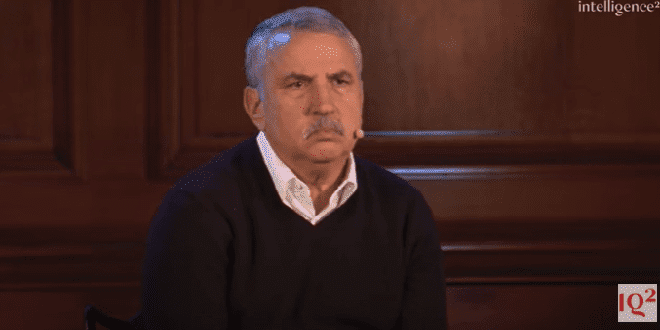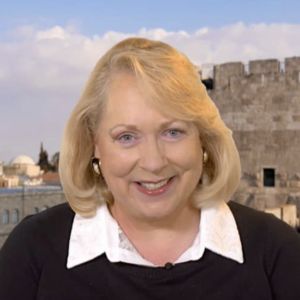On Nov. 4, The New York Times’ Tom Friedman, who reflects the worldview of the State Department establishment, lamented that “the Israel we knew is gone.”
Should one rely on Friedman’s assessments concerning the Middle East?
In September 1993, Friedman welcomed Yasser Arafat as a peace-seeking statesman. He established (an immoral) moral equivalence between a role-model of terrorism, Arafat, and a role-model of counterterrorism, Israeli Prime Minister Yitzhak Rabin: “Two hands that had written the battle orders for so many young men, two fists that had been raised in anger at one another so many times in the past, locked together for a fleeting moment of reconciliation.”
Friedman was trapped by Arafat’s strategy of dissimulation (taqiyya), highlighting Arafat’s peaceful English talk, ignoring Arafat’s violent Arabic talk and playing down Arafat’s unprecedented terroristic talk following the Oslo Accords.
In July 2000, Friedman posed the question: “Who is Arafat? Is he Nelson Mandela or Willie Nelson?” A more realistic question would be: “Who is Arafat? Is he Jack the Ripper or the Boston Strangler?”
Friedman’s pro-Palestinian stance dates back to his active involvement, while at Brandeis University, in the pro-Arafat radical-left Middle East Peace Group and Breira organizations. It intensified during his role as the Associated Press’ and New York Times’ reporter in Lebanon. There, he played down Arafat and Mahmoud Abbas’s rape and plunder of Lebanon, and their collaboration with Latin American, European, African and Asian terrorists, while expressing his appreciation of the PLO’s protection of foreign journalists in Beirut (who responded in kind).
The 2020 peace accords between Israel and the United Arab Emirates, Bahrain, Morocco and Sudan were concluded—contrary to Friedman’s worldview—because they centered on Arab interests, bypassing the Palestinian issue and denying the Palestinians veto power over the Israeli-Arab peace process.
In a July 15 column, Friedman asserted that Saudi Arabia considered the Palestinian issue central to its agenda. He ignored the gap between the warm Saudi talk and the cold-to-negative Saudi walk on the subject. Contrary to Friedman’s assessment, none of the pro-U.S. Arab regimes welcome a Palestinian state, which they expect to be a rogue regime, and therefore have never flexed their military or diplomatic (and barely any financial) muscle on behalf of the Palestinians. They consider Palestinians a role-model of intra-Arab subversion, terrorism and ingratitude, based on the Palestinian terrorist track record in Egypt (early 1950s), Syria (mid-1960s), Jordan (1968-1970), Lebanon (1970-1982) and Kuwait (1990).
Contrary to Friedman’s worldview, all pro-U.S. Arab regimes have realized that the Palestinian issue is not the crux of the Arab-Israeli conflict, a crown-jewel of Arab policymakers or a core cause of regional turbulence.
In the July 15 column, Friedman referred to Mahmoud Abbas as a moderate, peace-seeking and anti-terrorism leader, ignoring Abbas’ K-12 hate-education system, inciting sermons in Palestinian mosques, public monuments honoring terrorists and monthly allowances to families of terrorists.
In January and June 2000, Friedman was charmed by Bashar Assad’s background: A British-trained ophthalmologist, married to a British citizen of Syrian origin, fluent in English and French and president of the Syrian Internet Association. Friedman compared the eventual Syrian dictator and butcher to Deng Xiaoping, who led China’s economic reforms, modernization and rapprochement with the U.S.
Swept up by wishful thinking, Friedman assumed that Bashar could liberalize Syria, attract international investors, end the Arab rejection of the Jewish state and demolish the Iran-Syria axis, terminating Iran’s involvement in Lebanon. According to Friedman, the prerequisite for such a scenario was Israel’s withdrawal from the Golan Heights. However, as expected, Bashar decided to adopt his ruthless father’s brutality, demolishing Friedman’s assumptions and slaughtering Syria’s domestic opposition, irrespective of the Golan Heights and Israel’s existence.
In August 2006, Friedman told NPR that Assad’s Syria was not a natural ally of Iran. He maintained that Syria could become an ally of the pro-U.S. Jordan, Saudi Arabia and Egypt, ignoring Syria’s anti-U.S. track record since 1946 and its pro-Iran stance since 1979.
In June 2009, Friedman stated that “for the first time, [Middle East] forces for decency, democracy and pluralism have a little wind at their backs.” He added, “The diffusion of technology—the internet, blogs, YouTube and text messaging via cellphones” tilted the Middle East in favor of the U.S. He was determined to prevent Middle East reality from altering his vision, which is consumed by globalization, modernity, democratization and the internet. Unfortunately, the increasingly boiling and seismic Arab street from Morocco to the Gulf has repudiated his Pollyannish vision.
In February 2011, Friedman determined that “the Muslim Brotherhood is not running the [anti-Mubarak] show. … Any ideological group that tries to hijack these young people will lose. … The emerging spokesman for this uprising is Wael Ghonim, a Google marketing executive.”
Seized by the Arab Spring delusion, Friedman concluded that the Egyptian street “tried [radical] Nasserism, tried Islamism and is now trying democracy.” He was convinced that “the democracy movement came out of Cairo’s Tahrir Square like a tiger. … Anyone who tries to put the tiger back in the cage will get his head bitten off.”
Friedman underestimated the surge of the transnational Muslim Brotherhood and its credo: “Allah is our objective; the Quran is our law; the Prophet is our leader; Jihad [Holy War] is our way; and martyrdom for the sake of Allah is the highest of our aspirations.” To Friedman’s chagrin, the Muslim Brotherhood aims to consolidate Islamic Sharia law as the legal foundation in Muslim and “infidel” lands, as a prelude to the establishment of a global Islamic Caliphate.
In a May 25, 2021 column, Friedman opined that a Palestinian state west of the Jordan River would serve U.S. interests, ignoring the fact that such a state would doom the pro-U.S. Hashemite regime east of the Jordan, triggering a domino effect southward that would threaten the survival of all pro-U.S. oil-producing regimes in the Arabian Peninsula, according a geostrategic bonanza (and a military foothold) to Iran’s ayatollahs, Russia and China.
On July 15, Friedman wrote that sustaining Israeli control of Judea and Samaria will doom Israel to lose its Jewish majority. He ignores Israel’s unique demographic reality, with an unprecedented momentum of Jewish fertility (number of births per woman), especially among secular women, which exceeds the dramatically westernized Arab fertility rate. He overlooks Jewish net immigration and Arab net emigration; the 50% inflated Palestinian census; and the 68% Jewish majority in the combined area of Judea, Samaria and pre-1967 Israel, which benefits from unprecedented fertility and a net-migration tailwind.
Has Tom Friedman been mistaken or has he been disingenuous?
Reprinted with author’s permission from Jewish News Syndicate




